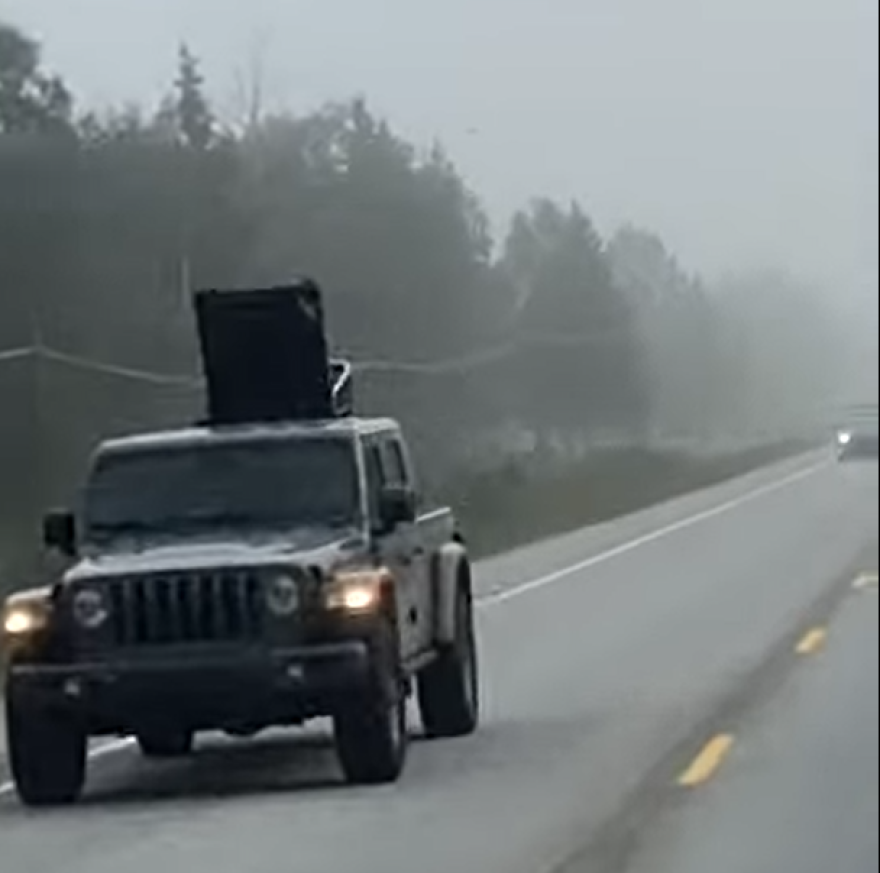Gale-force winds down trees onto power lines, sparking a dozen wildfires extinguished by Forestry, local agencies
Chinook winds gusting up to 75 miles per hour Saturday blew trees onto power lines and knocked out electricity for up to 10 hours in an area stretching from North Pole to Tok. The windstorm downed power lines that sparked a dozen small wildfires that crews quickly extinguished.

Gale-force winds out of the southwest blasted the eastern Interior Saturday in an area extending roughly from Isabel Pass to Northway.
“The strongest wind that we got was actually down in Isabel Pass, right at the mouth of the pass, and it got to 75 miles an hour,” says Adam Gill, a Fairbanks-based National Weather Service meteorologist. He says that’s also where the highest sustained winds were recorded.
“It looks like it touched about 40 miles an hour for about an hour or so,” he said Sunday.
Gill says the sustained winds died down later Saturday, but overnight they still ranged from 20 to 30 miles per hour, with gusts up to 60. Not much damage was reported around the area, however, except by Golden Valley Electric Association.
“So we had about 50 different situations where there were trees that had blown into power lines, says Meadow Bailey, Golden Valley’s spokesperson. “And all of those required response from our crews.”
Bailey said Sunday that the co-op initially dispatched four crews to chase after the problem, and added two more later in the afternoon as reports kept coming in of downed trees knocking out power from North Pole to Delta Junction.
“Our crews were working from about 3 p.m. on Saturday until 6 a.m. on Sunday morning, to restore all of the outages,” she said.

A dozen of those downed or damaged power lines sparked small fires in a couple of the communities hit by the windstorm.
“We had approximately five power-line fires in the Delta area and about seven in the Tok area,” says Kale Casey, a spokesperson for the state Division of Forestry and Fire Protection. He said that could’ve caused major problems if it weren’t for last week’s rain throughout the area.
“We’re lucky that we’ve had this intermittent moisture for the past week that’s keeping the tundra and the ground fuels nice and wet,” he said Sunday.
Even though the chinook dried out a lot of that vegetation, Casey said the situation could’ve have been a lot worse if the area hadn’t been dampened enough to keep the fires from spreading. He said none of the fires spread beyond a tenth of an acre.
“Thankfully, in all the locations where trees struck power lines, we didn’t have rapid fire growth,” he said. Quick responses to the fire reports by Forestry and local fire departments also halted the fires’ growth, he added, including “Delta Junction city fire department, Rural-Deltana, in our area, and then the Tok initial attack resources and the Tok volunteers.”
Casey says the rash of fires should serve as a reminder that, even though it’s late in the season, the danger of wildfire remains high.
“It’s never really over ’til it’s over,” he said, “and especially in certain areas like this, like Delta Junction, where you can get the winds that can arrive at any time.”
Bailey says the weekend windstorm also serves as reminder that property owners can help reduce the chances of a tree on their land getting blown over onto power lines that usually run through rights-of-way along the boundaries of their parcel.
“We do ask property owners, though, if you are near your right of way and you see trees that are leaning, go ahead and take them down on your own or call and ask to have somebody come in and have them removed,” she said.
Bailey says it’s an ongoing problem that Golden Valley has been dealing with for years.




